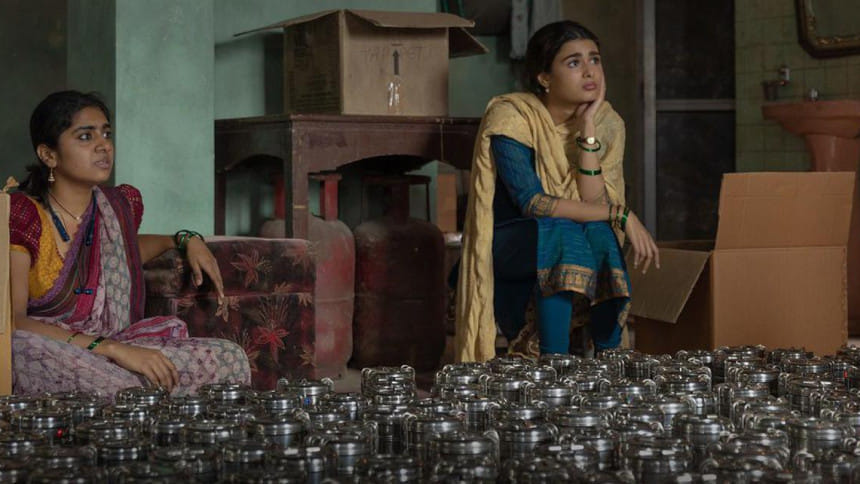‘Dabba Cartel’: A promising crime drama undone by inconsistencies

The Netflix series "Dabba Cartel", currently trending within the top 10 most viewed in Bangladesh, attempts to carve out a unique space in the crime drama genre by marrying the mundanity of everyday life with the high-stakes world of drug trafficking. Set against the backdrop of Mumbai's middle-class neighbourhoods, this Hitesh Bhatia directorial explores how five women from vastly different social backgrounds come together, not out of greed or ambition but out of necessity. Their journey, marked by unexpected alliances, betrayals, and moments of startling agency, should have made for a riveting watch—to some degree, it does. However, as the show unfolds, it becomes clear that its ambitions exceed its execution, resulting in a concoction that is fascinating in theory but flawed in practice.
The heart of the story lies in the lives of Raji (Shalini Pandey), a seemingly docile homemaker running a modest tiffin service; Mala (Nimisha Sajayan), her sharp-tongued domestic help with a burning desire to secure a better future for her daughter; Varuna (Jyotika), a woman trapped in a loveless marriage to Shankar (Jisshu Sengupta), a top executive at a powerful pharmaceutical company; Shahida (Anjali Anand), a savvy real estate broker; and Sheila (Shabana Azmi), Raji's mother-in-law, whose steely demeanour harbours secrets of her own. Their lives intersect in unexpected ways when their home-cooked meal service becomes a front for an illicit drug operation, using a pharmaceutical loophole to create a lucrative underground business. What follows is a series of events that propel these women into a world where power dynamics shift rapidly, and survival depends on calculated risks.

At its best, "Dabba Cartel" thrives on its character work, particularly in its depiction of gender and class dynamics. The invisibility of housewives, the underestimation of women in traditionally male-dominated spaces, and the dismissiveness with which the men in their lives treat them are all themes that the show navigates with a sharp observational lens. The husbands in particular—Shankar, whose sense of entitlement is suffocating, and others who dismiss their wives' intelligence—serve as stark reminders of the patriarchal structures that these women constantly battle, even before they enter the world of crime. The series is also astute in its portrayal of how power operates at different levels. The pharmaceutical company, the law enforcement system, and the drug underworld are all linked by a common thread: the men at the top rarely get their hands dirty, while those at the bottom are the ones forced to take the fall.
Where the show falters, however, is in its pacing and narrative coherence. The first few episodes do an excellent job of establishing the world and its characters, drawing the audience in with intriguing setups and layered conflicts. Nonetheless, as the series progresses, it struggles to balance its various subplots. Some characters, such as Chavan, are introduced with significant weight, only to be sidelined without resolution. Others, like Shahida's relationship with the police officer Preeti (Sai Tamhankar), feel underdeveloped, as though it was included as more as a token nod to representation rather than as a fully realised storyline. The problem is not just that these arcs feel incomplete but that they detract from the overall momentum of the series. Instead of deepening the core narrative, they disperse attention, making the show feel more scattered than it should.

Another issue is the somewhat inconsistent tone. There are moments when "Dabba Cartel" leans into the high-energy, almost heist-like thrills of its premise, particularly in scenes that involve carefully orchestrated plans and near-miss encounters. The use of playful musical cues, such as a cheeky nod to "Don", adds a sense of mischievousness to the proceedings, suggesting a show that does not take itself too seriously. But then there are stretches where the drama becomes excessively self-serious, with prolonged monologues and heated emotional beats that don't quite land as effectively as intended. This unevenness makes it difficult to fully invest in the stakes—the show wants to be both grounded and stylised, intimate and large-scale, but it never quite masters the transitions between these modes.
What ultimately keeps "Dabba Cartel" engaging despite its flaws is the strength of its performances. Shabana Azmi, as always, commands attention, bringing depth to a character who could have easily been one-note. Her presence alone elevates the material, lending a quiet menace to even the simplest of scenes. Nimisha Sajayan is another standout, capturing the fierce determination of a woman who refuses to let circumstances dictate her fate. There is a raw intensity to her performance that makes Mala one of the most compelling characters in the show. Jyotika, too, delivers a measured performance, portraying Varuna's journey from a sidelined wife to someone who reclaims control over her own life with quiet conviction. Among the male cast, Gajraj Rao makes the strongest impression as the methodical investigator slowly unraveling the cartel's secrets, his composed demeanour masking a sharp intelligence. Jisshu Sengupta plays his role with the right amount of arrogance and threat, embodying the kind of corporate villain who sees people as mere stepping stones.

Visually, the show benefits from strong cinematography by Eeshit Narain, who captures both the grittiness of the underbelly and the lived-in warmth of middle-class homes with equal finesse. The crowded alleys, the dimly lit warehouses, the rain-soaked streets of Mumbai—all add to the show's texture, grounding it in a recognisable reality even when the plot veers into improbable territory. The production design effectively contrasts the domestic and the dangerous, reinforcing the idea that these women are operating in two vastly different worlds at once. The score, composed by Gaurav Raina and Tarana Marwah, is another high point, adding an energetic pulse to key sequences and enhancing the overall mood.
Despite all these strengths, "Dabba Cartel" never quite becomes the gripping saga it sets out to be. The writing, while insightful in moments, is inconsistent in its execution. The show's biggest misstep is that it does not fully commit to either being a sharp social commentary or an edge-of-the-seat crime thriller, instead oscillating between the two in a way that sometimes weakens both aspects. There is a lot to appreciate—its performances, its thematic ambitions, its fresh perspective on women in crime—but there is also a nagging sense of unrealised potential. As the final episodes set the stage for what is clearly meant to be a continuation, one can only hope that future instalments will refine what works and streamline what does not. "Dabba Cartel" may not be perfect, but it is undeniably intriguing, a series that understands the power of its central characters even if it does not always know how to wield it. If given the right direction, this cartel might just find its true strength in the seasons to come.

 For all latest news, follow The Daily Star's Google News channel.
For all latest news, follow The Daily Star's Google News channel. 




Comments